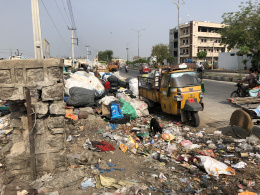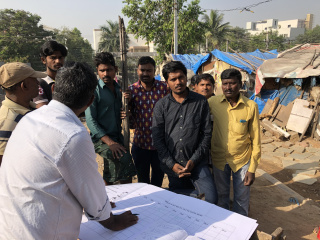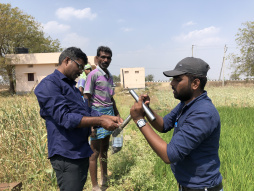Does the planet clean up after us?
This blog by Indunee Welivita is the first in a series of blogs about the work of the Rurality as a Vehicle for Urban Transformation (RUST) project. It was originally posted on the RUST website.

Safely disposing of human waste has become a major problem in many of the big cities in India. This problem partly arises because Indian cities are vast (e.g. both Delhi and Mumbai have a population over 1.5 times bigger than London), but also because a considerable amount of people are living in “hidden”, “messy” and “informal” communities such as slums, shanty areas and temporary households. These communities often lack essential services as the areas they live are not a responsibility of any municipal council so that they are long ignored.
When sanitation services are lacking, people often resort to dumping their waste and going to the toilet in shared public spaces. This leads to sanitation related illnesses such as typhoid, malaria, cholera & diarrhoea.
How can nature help?

Throughout the globe, people receive benefits from nature and scientists refer to these benefits as ‘ecosystem services’. In some areas these services play a major role in providing people with sanitation, food, water, and other basic needs. So, in areas where infrastructure is lacking, does nature step in to support local people?
As part of the RUST project, we aim to answer this question and other similar questions (e.g. are rural people more connected to nature than those living in cities?). At 75 locations across Hyderabad city, India we have interviewed households about their relationships with nature.
At over half of these locations, we did the same at a community level – holding discussions with groups of people to build-up an idea of the overall consensus. We also carried out scientific measurements and planning to run models to answer the same questions. Our hope was that carrying out multiple methods would help us uncovered the answer. Specifically, we studied 11 ‘ecosystem services’, and these were:
So, what have we found?
It is currently too early to share conclusive findings. Science takes time, and we are currently starting complex statistical analyses to try and found out what all our data are showing us. Once this is complete, we hope our future findings will help policy makers understand what services are provided by nature and what services should be provided by the administrative bodies to facilitate each communities a better life.

We expect our results will show variation in peoples’ dependency on nature as you move from rural to urban areas and that people in villages have a high dependency on environment for their basic requirements.
Since we have used many methods to answer our questions, we can compare each method to identify its strengths and weaknesses. This will help future scientists choose the method that will work best for them.
We hope to complete our analyses by the end of 2019 and will share our results with you then!